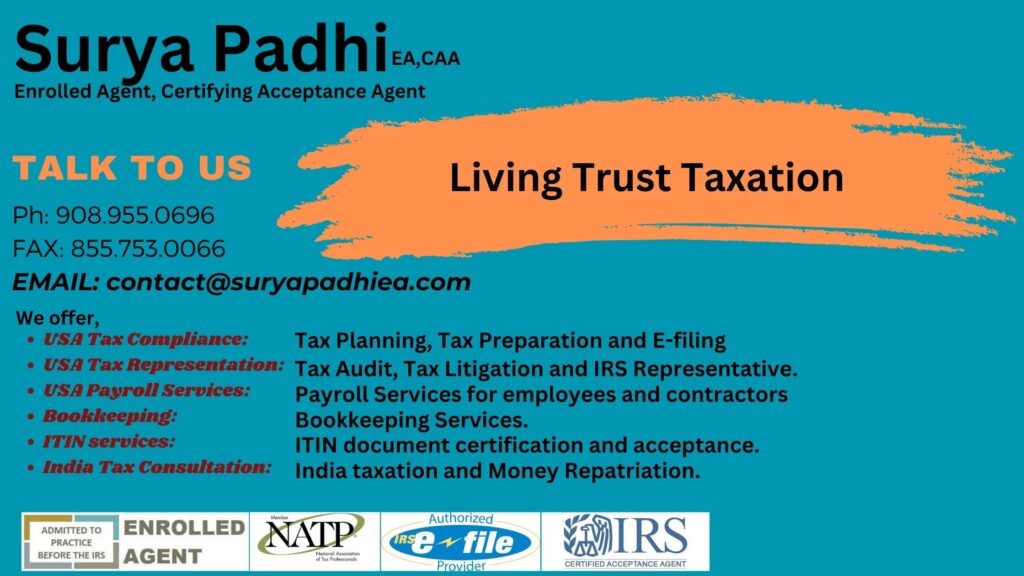
A Living Trust is typically a Revocable Trust, which means that the Grantor has the ability to withdraw Trust assets at any time. Because they can prevent the Grantor from having to undergo the Probate process upon their demise, these types of Trusts are frequently employed as Estate Planning instruments. Nevertheless, those who are interested in establishing a Living Trust frequently have concerns regarding the taxes associated with it. One of the primary inquiries is: “How do taxes operate in a living trust?” A significant number of individuals are interested in understanding the tax implications of a trust prior to setting one up. This article provides a concise summary of the tax implications of a Revocable Trust and the taxation of a Living Trust. Additionally, it addresses frequently asked queries regarding Living Trust taxes.
| During the Grantors’ Life- Ability to Perform | During the Grantors’ Life- Incapacity to Perform | After Grantors’ Death |
| Income of the trust is aggregated with grantor and taxed. | Depending on the situation, the trust income might be aggregated or taxed separately. | Income taxed as trust income. |
Living trust tax during the grantor’s lifetime
The Grantor is the individual who establishes and finances the Living Trust. The Grantor has the ability to transfer assets into and out of the Living Trust or terminate it if they so choose when the Trust is established as a Revocable Trust, which is the most widely used setup. Consequently, the Grantor continues to be entitled to the principal and income of the Trust. Consequently, the Grantor continues to be subject to taxation by the IRS on the income generated by the Trust. The Trust’s income can be reported on the Grantor’s tax return, as it can use the Grantor’s social security number to establish bank accounts and investments. A Revocable Living Trust will not necessitate a separate tax return. Nevertheless, the assets are legally held by the Trust, which will survive the Grantor’s demise, despite the fact that the Grantor is taxed on the Trust income. That is the reason why the assets in the Trust are exempt from the probate procedure.
Living Trust Tax After Grantor’s Death After the Grantor’s death.
The Trust remains in place and continues to hold legal ownership of all the Trust assets. The Revocable Trust tax implications, following the death of the Grantor, impact both the Grantor’s Estate and the Beneficiaries’. The Grantor’s final tax return is filed by the Trustee or Executor of the Grantor’s Estate, and it declares all the income earned by the Grantor through the Grantor’s death. However, any income earned by the Trust assets or principal after the date of the Grantor’s death is reported in a separate tax return for the Trust. The requirement that the Trust file its own tax return is a result of the status of the Trust changing from a Revocable Trust during the Grantor’s life to an Irrevocable Trust upon the Grantor’s death. As a result, the Trust must file its own tax return each year. The beneficiaries of the Trust may also be entitled to distributions from the Trust, which are typically deducted from the income of the Trust on the Trust’s tax return. Depending on the type of distribution, the amount of the distribution, and other factors, the beneficiaries may have to claim income from the distribution on their own tax returns. If the distribution represents a non-income portion of the Trust principal, it is likely no taxes will be owned. Beneficiaries should receive a report each year from the individual or entity responsible for managing the report. The report will indicate what if any income from the Trust needs to be reported by the Beneficiaries on their own tax returns. If Beneficiaries receive reports of Trust income after their own tax returns have already been filed, they will need to file an amended return, known as a Form 1040X. If the Beneficiaries have not received distributions, then the Trust pays the taxes on the Trust’s income, and the beneficiaries have no need to include the Trust’s income on their return.
Let us know if we can help you?
Contact Surya Padhi at Sure Financials for any questions and clarification. Surya Padhi is an expert who keeps current on tax law changes as well as a member of the National Association of Tax Professionals National Association of Tax Professionals (NATP) and New Homepage – National Association of Enrolled Agents (naea.org). Visit Welcome | Sure Financials & Tax Services, LLC (surefintaxsvs.com) for more information and contact us by calling +1908.955.0696.